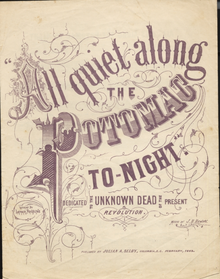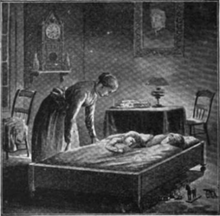
Turner Ashby Jr. was an American officer. He was a Confederate cavalry commander in the American Civil War.
Ethel Lynn Beers was an American poet best known for her patriotic and sentimental Civil War poem "All Quiet Along the Potomac Tonight".

The Battle of Carthage, also known as the Engagement near Carthage, took place at the beginning of the American Civil War on July 5, 1861, near Carthage, Missouri. The experienced Colonel Franz Sigel commanded 1,100 Federal soldiers intent on keeping Missouri within the Union. The Missouri State Guard was commanded by Governor Claiborne F. Jackson himself and numbered over 4,000 soldiers led by a hero of Mexico, Sterling Price, along with 2,000 unarmed troops who did not participate in the battle.
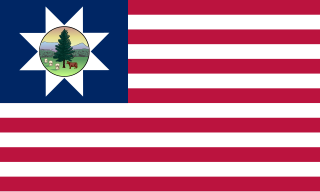
The 2nd Vermont Brigade was an infantry brigade in the Union Army of the Potomac during the American Civil War.

The 12th Vermont Infantry Regiment was a nine months' infantry regiment in the Union Army during the American Civil War. It served in the eastern theater, predominantly in the Defenses of Washington, from October 1862 to July 1863. It was a member of the 2nd Vermont Brigade.

The 15th Vermont Infantry Regiment was a nine-months' infantry regiment in the Union Army during the American Civil War. It served in the eastern theater, predominantly in the Defenses of Washington, from October 1862 to August 1863. It was a member of the 2nd Vermont Brigade.

The 14th Vermont Infantry Regiment was a nine months' infantry regiment in the Union Army during the American Civil War. It served in the eastern theater, predominantly in the Defenses of Washington, from October 1862 to August 1863. It was a member of the 2nd Vermont Brigade.

The 16th Vermont Infantry Regiment was a nine months' infantry regiment in the Union Army during the American Civil War. It served in the eastern theater, predominantly in the Defenses of Washington, from October 1862 to August 1863. It was a member of the 2nd Vermont Brigade.

The 10th Maine Infantry Regiment was mustered in for two years of service at Portland, Maine, on October 4, 1861, by then-Major Seth Eastman. It was mustered out on May 8, 1863, also at Portland. The regimental commander was Colonel George Lafayette Beal. The 10th Maine was a re-organization of the 1st Maine Infantry, a regiment primarily composed of men with two-year enlistments that was mustering out after completing three months of Federal service. Eight companies of the 1st Maine were retained in service, with Companies A and D replaced by newly recruited companies.
Nationality words link to articles with information on the nation's poetry or literature.

The 2nd Rhode Island Infantry Regiment was an infantry regiment composed of volunteers from the state of Rhode Island that served with the Union Army in the American Civil War. They, along with the 1st Rhode Island, wore a very simple uniform. The uniform composed of a dark blue jacket like shirt, tannish grey pants, and a dark blue chasseur kepi. The 2nd Rhode Island also wore havelocks in the beginning of the war, but after finding them useless they discarded them.
The Romney Expedition was a military expedition of the Confederate States Army during the early part of the American Civil War. It is named for Romney, West Virginia, which at the time was still in the state of Virginia. The expedition was conducted in this locale from January 1 to January 24, 1862, as part of the preliminary actions of Stonewall Jackson's Valley Campaign. Confederate forces under Major General Thomas J. "Stonewall" Jackson cleared Union forces under Major General Nathaniel Banks and Brigadier General William S. Rosecrans from the lower Shenandoah Valley and surrounding Allegheny ranges, and then successfully severed the Baltimore and Ohio Railroad and the Chesapeake and Ohio Canal.
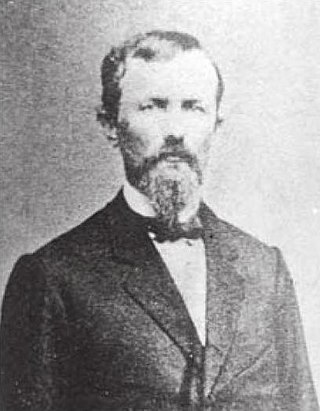
Benjamin Franklin "Grimes" Davis was an American military officer who served in Indian wars, and then led Union cavalry in the American Civil War before dying in combat. He led a daring escape from the Confederate-encircled Union garrison at Harpers Ferry.

USS Jacob Bell was a sidewheel steamer acquired by the Union Navy for use during the American Civil War. She was one of the oldest vessels so acquired. Her duties included river patrols, guard duty, and other duties as assigned.
The 1st Maryland Infantry Regiment, Potomac Home Brigade was an infantry regiment that served in the Union Army during the American Civil War.

Upton's Hill is a geographic eminence located in western Arlington County, Virginia. Its summit rises to 410 feet (120 m) above sea level.
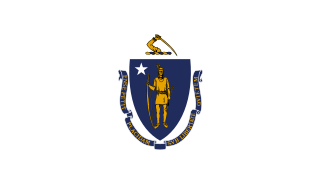
The 13th Regiment Massachusetts Volunteer Infantry was an infantry regiment in the Union Army during the American Civil War. It was formed on July 16, 1861, at Fort Independence in Boston, Massachusetts. Its original commander was Colonel Samuel H. Leonard.

The 80th New York Infantry Regiment, the "Twentieth New York State Militia", "Ulster Guard", was an infantry regiment of the Union Army during the American Civil War.

The 1st Massachusetts Volunteer Cavalry Regiment was a cavalry regiment that served in the Union Army during the American Civil War.

Lamar Fontaine was an American military officer, spy, surveyor, poet and author. He served in the Mexican–American War and the American Civil War, and he was a member of the Ku Klux Klan. He drew maps of Israel, Japan and China. He authored poetry and a memoir.
